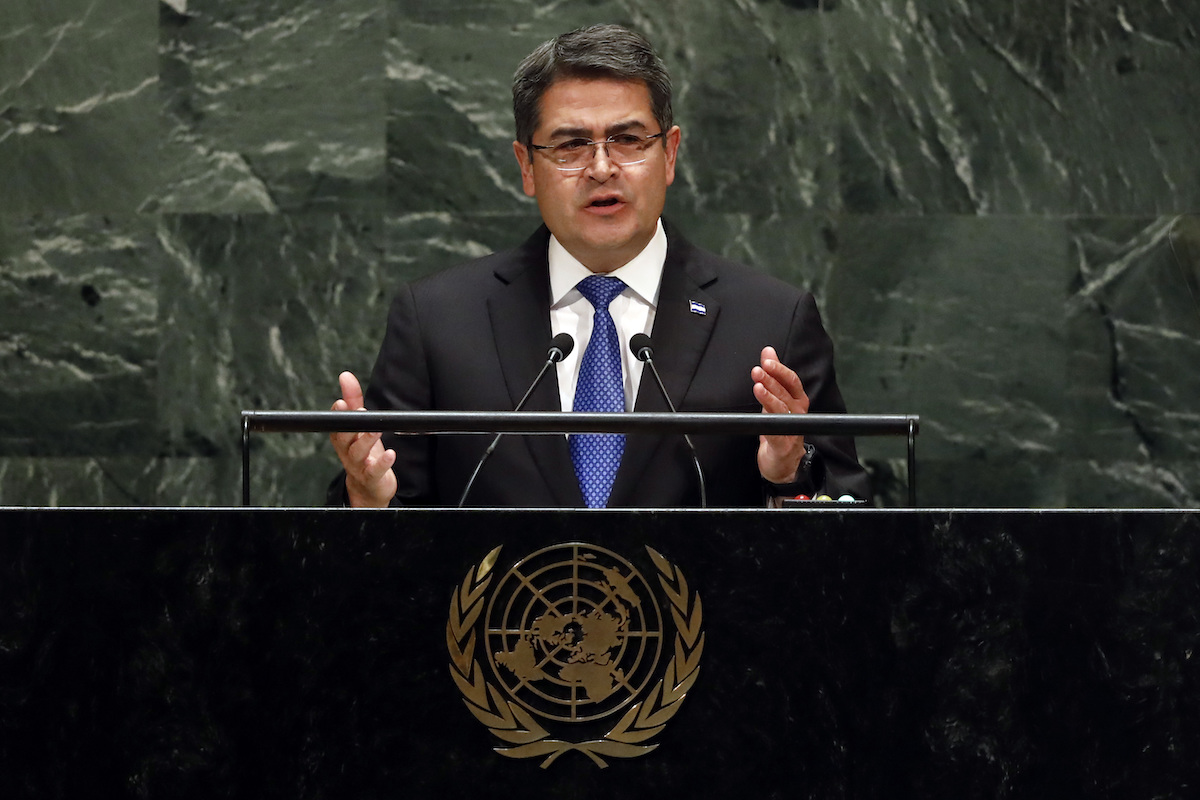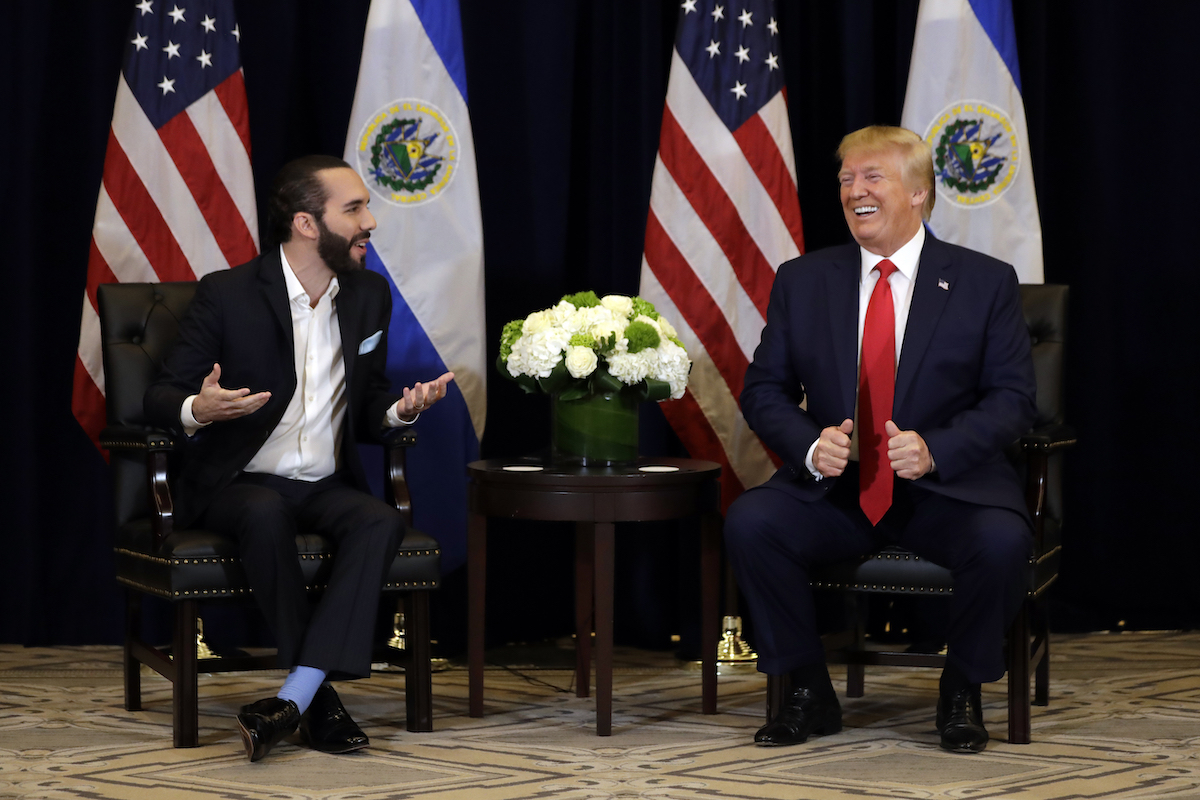

Honduras President Juan Orlando Hernández Alvarado addresses the 74th session of the United Nations General Assembly, Wednesday, Sept. 25, 2019. (AP Photo/Richard Drew)
By COLLEEN LONG and ELLIOT SPAGAT, Associated Press
WASHINGTON (AP) — The Trump administration and Honduras signed an agreement Wednesday that would effectively prevent asylum-seekers traveling through Central America from entering the United States. It follows earlier deals with El Salvador and Guatemala and would pave the way to send asylum-seekers to Honduras, among the world’s most violent countries, as is its neighbors.
President Donald Donald Trump, in a meeting with El Salvador’s president, Nayib Bukele, on the sidelines of the U.N. General Assembly, praised the regional accords. “That’s good for all of us,” he said.
A similar arrangement was signed with El Salvador last week; a more comprehensive agreement was previously sealed with Guatemala.


President Donald Trump meets with President Nayib Bukele of El Salvador at the InterContinental Barclay New York hotel during the United Nations General Assembly, Wednesday, Sept. 25, 2019, in New York. (AP Photo/Evan Vucci)
The details of the Honduran agreement have not been released and much remains unclear, including when it would take effect. A senior Homeland Security Department official described broad outlines on a conference call with reporters and spoke on condition of anonymity, according to briefing ground rules.
The deal would complete a central component of Trump’s strategy to deter asylum-seekers from entering the U.S. through Mexico. Curbing immigration is the president’s signature political issue, and Trump constantly cites “loopholes” in the U.S. asylum system.
U.S. immigration officials said in March that the U.S. border had reached a breaking point, with tens of thousands of migrant families crossing. That had led to massive overcrowding and reports of fetid and filthy conditions and prolonged detention at U.S. border facilities not meant to hold people more than a few days. It’s unclear whether the numbers will rise again as the desert weather cools.
Meanwhile, the U.S. Supreme Court this month cleared the way for the administration to deny asylum to anyone who traveled through another country to reach the border.
The asylum ban has taken effect in tandem with U.S. efforts to help impoverished, dangerous and corrupt Central American countries absorb large numbers of people seeking refuge there. The State Department acknowledged the poor conditions in Honduras in a 2018 human rights report.
“Organized criminal elements, including local and transnational gangs and narcotics traffickers, were significant perpetrators of violent crimes and committed acts of homicide, extortion, kidnapping, torture, human trafficking, intimidation, and other threats and violence directed against human rights defenders, judicial authorities, lawyers, the business community, journalists, bloggers, women, and members of vulnerable populations,” the report said.
It said that there were reports “arbitrary and unlawful killings,” complaints of torture, arbitrary arrests and detentions and “harsh and life-threatening prison conditions.”
In a nod to the absence of a robust network to absorb refugees, acting Homeland Security Secretary Kevin McAleenan on Monday announced $47 million in aid for Guatemala to build its asylum system. It remains unclear what assistance El Salvador and Honduras may get.
A joint statement Wednesday said the U.S. and Honduras would develop best practices “to increase protection options for vulnerable populations.”
Meanwhile, this just in from @DHSgov. News of a new migration agreement between the US and Honduras. pic.twitter.com/T8oxyH9gTE
— Julio Ricardo Varela (@julito77) September 25, 2019
It also said “coordination and collaboration between the governments of the United States and Honduras has increased to new, unprecedented levels.”
Most families arrested or stopped at the U.S.-Mexico border are from the area known as the Northern Triangle: Guatemala, Honduras or El Salvador. While they would not be returned to their home countries, they would be sent to other countries they passed through. For example, Hondurans must travel through Guatemala to reach the U.S. by land.
The agreement would likely have its biggest direct impact on people of other nationalities, including many from Cuba and Africa, who fly to countries south of the Northern Triangle and travel by bus to the United States, most commonly through Honduras and Guatemala.
In another effort to deter asylum-seekers, the Trump administration has made more than 42,000 people, largely Central Americans, wait in Mexico and cross the border for hearings in U.S. immigration court.
It is unclear what steps are needed for Honduras’ government to fully embrace the arrangement.
Trump met Wednesday with Honduran President Juan Orlando Hernández in New York. The meeting was not open to press.
Hernández has been named by U.S. prosecutors as a co-conspirator in his brother’s drug-trafficking case and protesters have called for him to step down. Hernández has said the allegations come from drug traffickers seeking revenge against him, but U.S. prosecutors say they will present evidence showing that Hernández harnessed his brother’s drug-trafficking connections to propel his own political fortunes. A trial is scheduled for October
At the United Nations, Hernández said “drug trafficking, gangs, organized crime, armed groups—they create violence which slows development and is an assault on the dignity of the human being.” He added: “This creates forced and irregular immigration.”
***
Spagat reported from San Diego. Associated Press writer Jennifer Peltz in New York contributed to this report.


